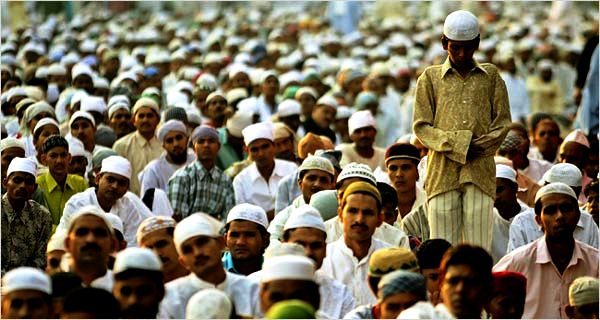Indira Satyanarayan for BeyondHeadlines
“Change being an inevitable part of life, the orthodox clergy must be willing to move ahead according to the times and agree to the modernization of the Madrassas. Their reluctance could cost their community much loss for which they have only themselves to blame.”
The conflict between the radicals and the liberals in Islam is spilling into the controversy of modernizing Madrassas. The Sachar Committee report exhibits “deficiency and deprivation” in almost all aspects of Development. The overall percentage of Muslims in bureaucracy in India is just 2.5 percent, whereas Muslims constitute above 14% of the Indian population. Progressive Muslims feel that a significant way to improve the socio economic status of marginalized Muslims would be through the community acquiring skills and getting access to Quality Academic Education — both not found in the Madrassas.
Salahuddin Shoab Choudhury, who has done extensive research on the Madrassas, observes in the Indian Muslim Observer that, “Muslims consider Madrassas as the basic place of generating clergies as well as those who can be custodians of Islam in the respective countries. But many are still unaware that in the name of religious education the major segment of such Madrassas are active breeding grounds for jihadists, instead of real Islamic education, the students are taught of religious hatred”.
While the affluent and the socially well connected can afford to send their children to convent schools and later abroad for Higher Education the target group here are the Muslims from the lower strata of society who due to poverty and illiteracy are compelled to send their children to the Madrassas. Madrassas are run on the donations given by Muslim philanthropists.
Understandably most of the times the Madrassas lack funds to employ competent qualified teachers and provide the required academic infrastructure like a well equipped laboratory and library needed for the students’ academic growth. The curriculum imparted at the Madrassas is limited, outdated not in sync with the main stream education which is currently aiming at a global higher education.
Therefore it is not surprising that students who pass out of Madrassas are left behind professionally; they find it difficult to get lucrative jobs. We hardly see students from the Madrassas get into the IAS, IPS and the UPSC because the Madrassas don’t train them to tackle competitive examinations.
A typical Madrasa curriculum lays more emphasis on religious teaching rather than on scholastic acquirements. A typical Islamic school usually offers two courses of study –Hifz Course teaching the memorization of the Quran and an Alim Course leading the candidate to become an accepted scholar of the community.
A regular curriculum included courses in Arabic, tafsir (Quranic interpretation) Shariah (Islamic law) and Hadiths (recorded sayings and deeds of the Prophet) Mantiq (logic) and Muslim HISTORY. Some Madrassas offer courses of Arabic Literature, English and other foreign languages. There is no room for extracurricular activities in the Madrassas. All educationists would agree that holistic education is incomplete without extracurricular activities. All these points highlight the need to revamp the syllabus in the Madrassas.
Most of the Muslims feel that the development of India is not possible without the socio economic development of their community and rightly so. Muslims cannot be isolated from the development of India. To raise the socio economic levels in their community through academics the liberals are coming forward to train Muslim students to aspire for competitive examinations.
Maulana Shamsudeen Qasimi runs an IAS Academy from the Makkah Masjid in Chennai. This however is not the first time when learning was imparted from a mosque. During the time of the Prophet the mosque of Medina was not only a place of worship people assembled there to learn. IAS aspirants are getting trained at the HAJ House in South Mumbai. Hag House has allotted 3 floors as a Guidance Centre to train students appearing for UPSC Examinations and also provides boarding and lodging to these students.
While the progressive section in the Muslim community wants to move ahead, the radicals want to pull down the community and deter its advancement. This is a real cause for concern. When Maulana Azad tried to establish an All India Madrasa Board to stabilize religious education with a proper pay scale for teachers and a proper examination for students there was resistance by Mufti Atiq-ur-Rehman Usmani, Maulana Shibli Nomani and Maulana Hifz –ur-Rehman — all close associates of Maulana Azad. The same resistance is seen when Finance Minister Arun Jaitley announced one billion rupees for the modernizing of Madrassas in his 2 hour budget speech to the parliament.
The conservative clergy do not want to lose their hold over the impoverished sections of the Muslims who inhabit the Madrassas. The Darul Uloom Deoband has raised apprehension over the budget allocation of the central Government to modernize Madrassas and has asked the Government to clarify the road map of the plan.
Advocate S. Venkateshwar of the Bombay High Court says, “if Modi doesn’t give funds to improve the Madrassas he is communal and anti Muslim and when he does allocate funds to upgrade the Madrassas the clergy suspect his intention”. “This insecurity which is eating into the minds of the Muslim Hardliners has to be addressed first”, says Advocate Venkateshwar.
Khalid Rashid Firangimehli, a member of the All India Muslim Law Board, says, “we welcome the government’s decision to ear mark funds for modernization of the Madrassas but there is no question of bringing any change in the syllabus of theological education.’’
According to the Deccan Herald, “the deadlock over the Government proposal to modernize the Madrassas shows a minority mindset.” Change being an inevitable part of life, the orthodox clergy must be willing to move ahead according to the times and agree to the modernization of the Madrassas. Their reluctance could cost their community much loss for which they have only themselves to blame.
[The author is a Senior Correspondent at Hindu Voice. Views expressed are personal; may not necessarily reflect BH’s point of view.]






















